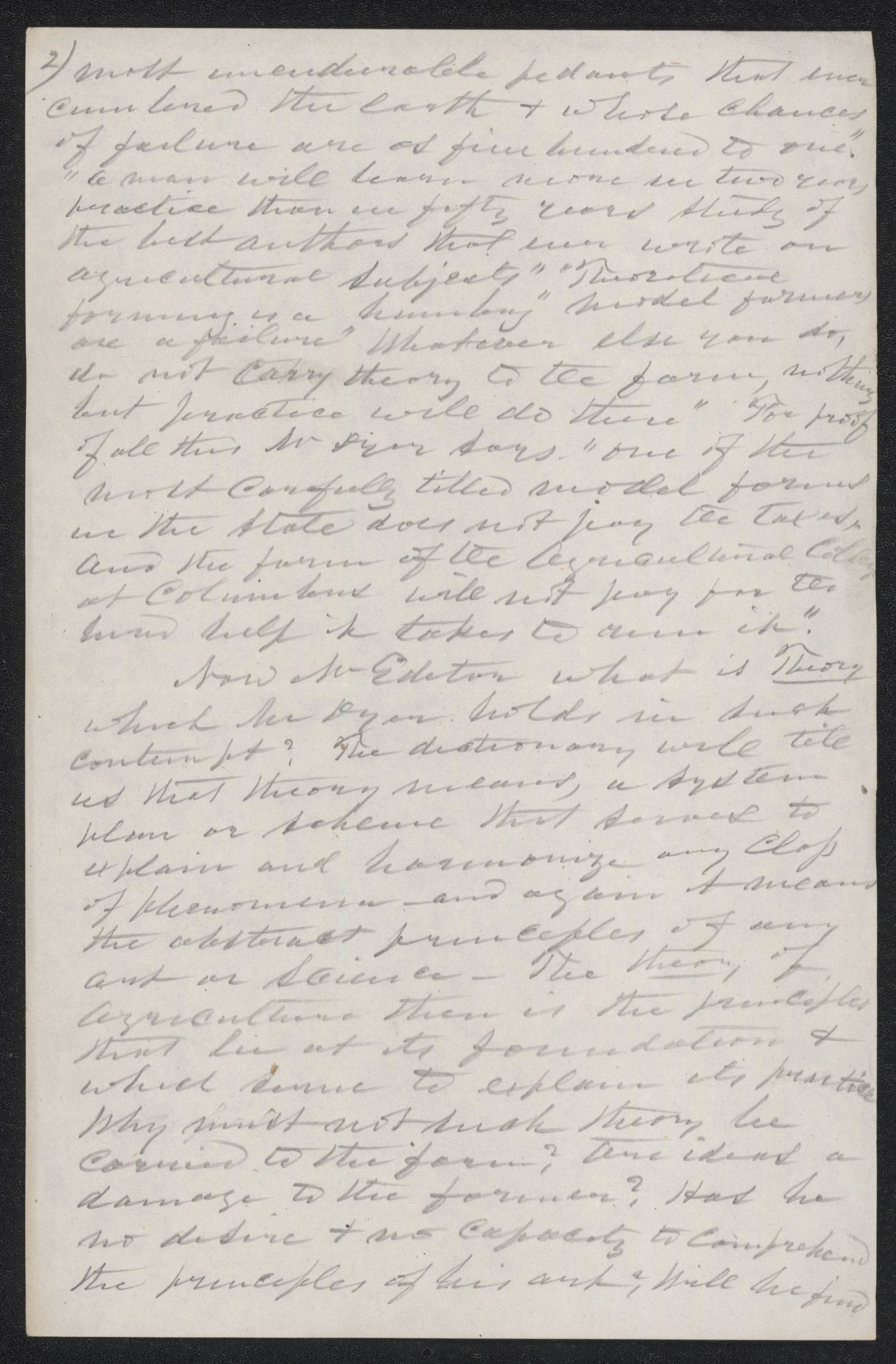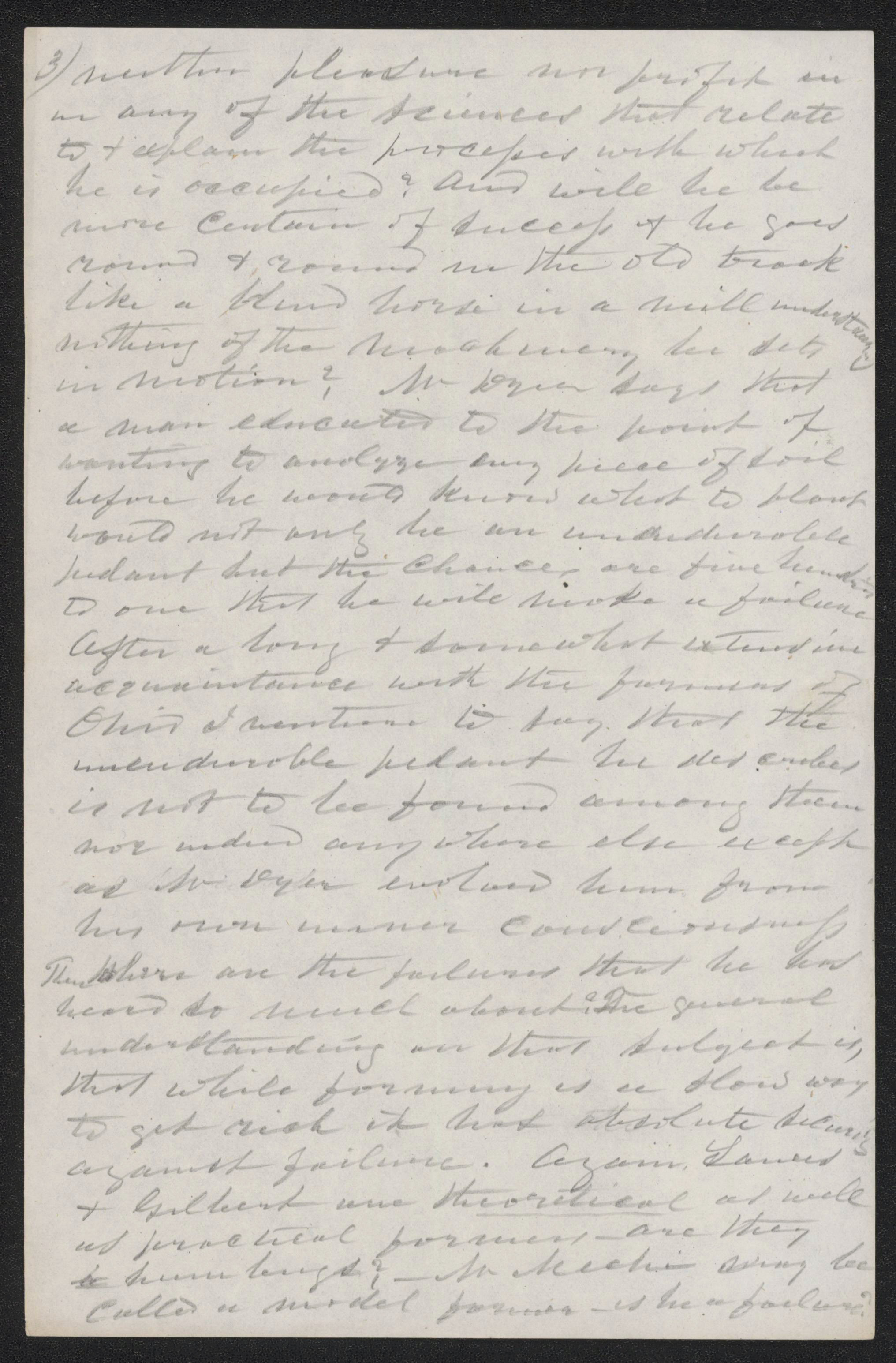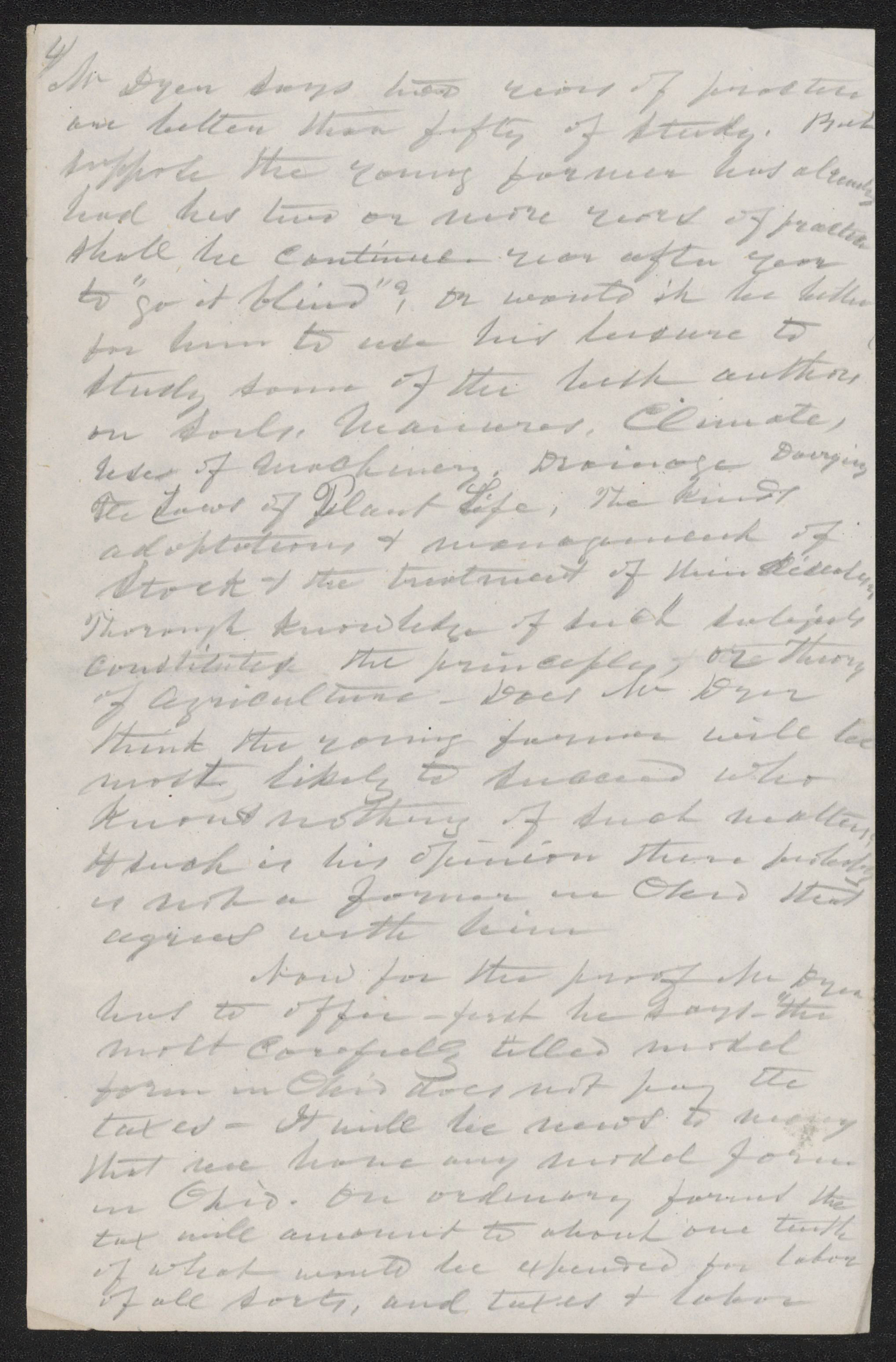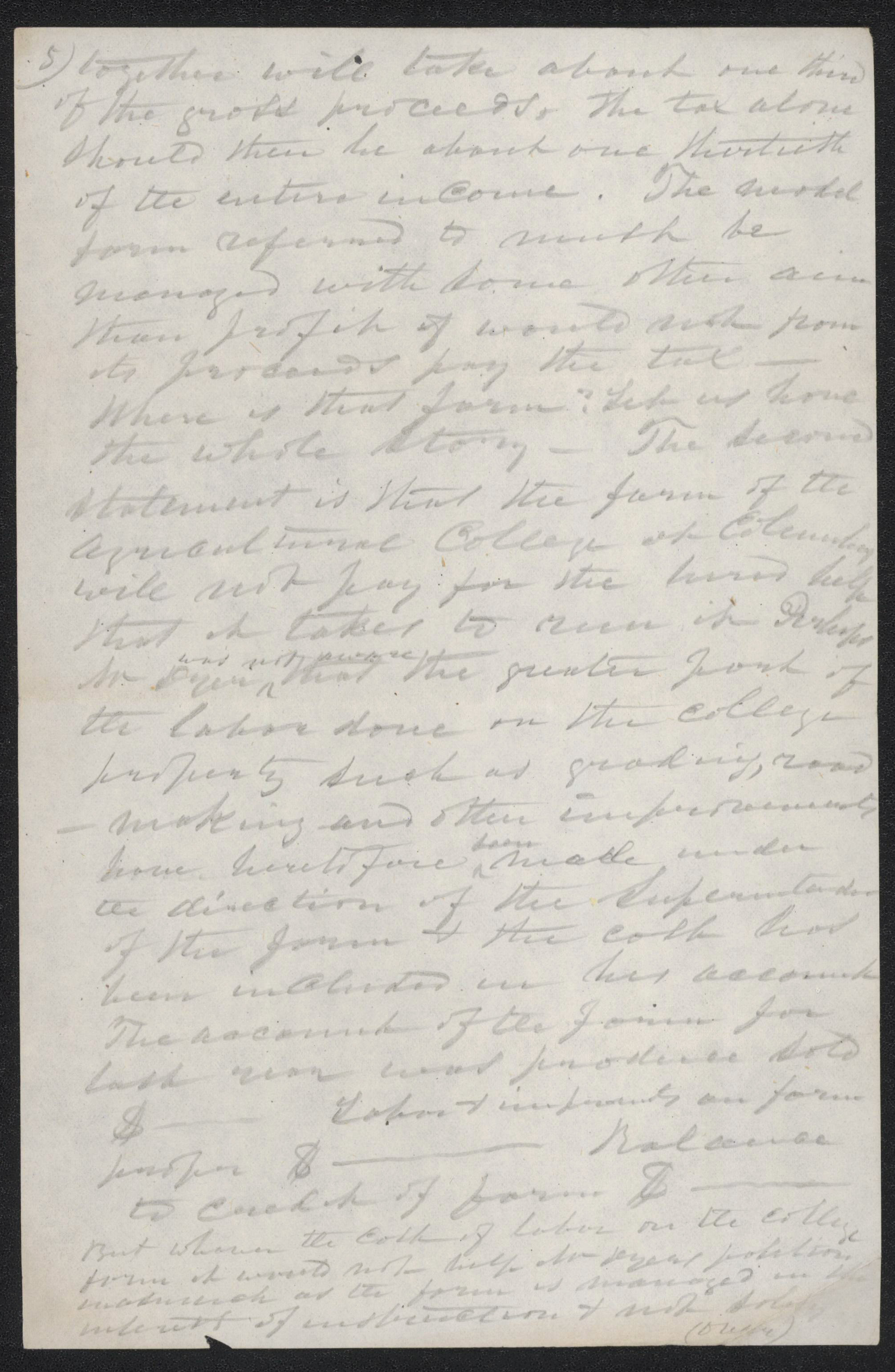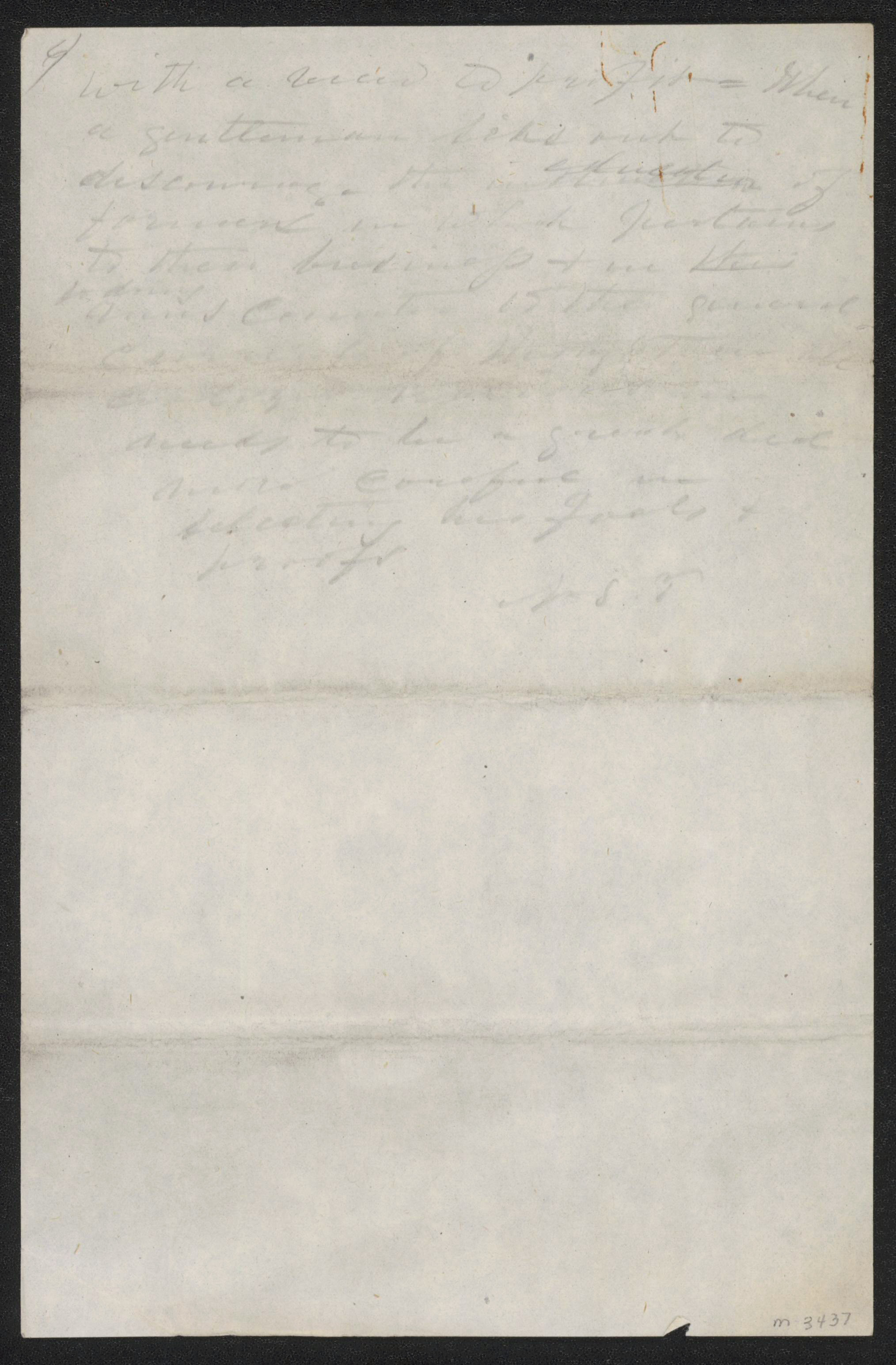Norton Strange Townshend “Theoretical Farming vs Practical Stupidity”, Undated
Related Resources
“Theoretical Farming vs Practical Stupidity,” Norton Strange Townshend, undated. Norton Strange Townshend Family Papers, Box 15, Folder 10.
“Theoretical Farming vs. Practical Stupidity”
Friend Lawrence,
Your last contains extracts from an address delivered before Kenyon College by R. Dyer, in which Ignorance is represented as no obstacle to a farmers success–while the attempt to apply scientific principles to practice is ridiculed and said to lead to failure. Such views, brought to the notice of farmers through your paper cannot be accepted without question.
That I may not do injustice to Mr. Dyer, let me here repeat some of his expressions “Tilling the soil is an occupation in which any man no matter how ignorant may engage with profit.” “The Majority of farmers are men of little education & those who have been brought up on the farm are not often men of refinement.” “But why do they succeed so well.” “Year after year we hear of men breaking up & selling their farms & returning to day labor for a support.” “It is the high minded pedant who does everything by theory.” “When you educate a Man (the farmer) to such a point that he thinks he must analyze every piece of soil in order to know what to plant, you have made one of the
most endurable pedants that ever the earth & whose chances of failure are as five hundred to one.” “A man will learn more in two years practice than in fifty years study of the best authors that ever wrote on agricultural subjects.” “Theoretical farming is a humbug.” “Model farmers are a failure.” “Whatever else you do, do not carry theory to the farm, nothing but practice will do there.” For proof of all this Mr. Dyer says, “one of the most carefully tilled model farms in the State does not pay the taxes, and the farm of the Agricultural College at Columbus will not pay for the hired help it takes to run it.”
Now Mr. Editor what is Theory, which Mr. Dyer holds in such contempt? The dictionary will tell us that theory means, a system, plan, or scheme that serves to explain and harmonize any class of phenomena and again it means the abstract principles of any art or science. The theory of Agriculture then is the principles that lie at its foundation & which serve to explain its practice. Why must not such theory be carried to the farm? True ideas a damage to the farmer? Has he no desire & no capacity to comprehend the principles of his art? Will he find
neither pleasure nor profit in many of the sciences that relate to & explain the principles with which he is occupied? And will he be more certain of success if he goes round & round in the old track like a blind horse in a mill, understanding nothing of the machinery he sets in motion? Mr. Dyer says that a man educated to the point of wanting to analyze any piece of soil before he would know what to plan would not only be an unendurable pedant but the chances are five hundred to one that he will make a failure. After a long & somewhat intensive acquaintance with the farmers of Ohio I venture to say that the unendurable pedant he describes is not to be found among them, nor under indeed anywhere else except as Mr. Dyer evolved him from his own inner consciousness.
Then where are the farmers that he has heard so much about? The general understanding on that subject is, that while farming is a slow way to get rich it has absolute security against failure. Again, [Lauers?] & Gilbert are theoretical as well as practical farmers–are they humbumgs? Mr. [Micks?] may be called a model farmer–is he a failure?
Mr. Dyer says two years of practice are better than fifty of study. But suppose the young farmer has already had his two or more years of practice. Shall he continue year after year to “go it blind”? Or would I be better for him to use his leisure to study some of the best authors on Soils, Measures, Climate, Use of Machinery, Drainage, Dairying, The Laws of Plant Life, the Kinds, Adaptations & Measurement of Stock & the treatment of their diseases. Thorough knowledge of such subjects constitutes the principles or theory of Agriculture. Does Mr. Dyer think that the young farmer will be most likely to succeed who knows nothing of such matters? If such is his opinion there probably is not a farmer in Ohio that agrees with him.
Now for the proof Mr. Dyer has to offer–first he says “the most carefully tilled model farm in Ohio does not pay the taxes.[“] It will be news to many that we have any model farm in Ohio. On ordinary farms the tax will amount to about one tenth of what would be expended for labor of all sorts, and taxes and labor
together will take about one third of the gross proceeds. The tax alone should then be about one thirtieth of the entire income. The model farm referred to must be managed with some other aim than profit–it would not from its proceeds pay the tax. Where is that farm? Let us have whole story. The second statement is that the farm of the Agricultural College at Columbus will not pay for the hired help that it takes to run it. Perhaps Mr. Dyer was not aware that the greater part of the labor done on the college property such as grading, round-making, and other improvements heretofore been made under the direction of the Superintendant of the farm & the cost has been included in his accounts. The account of the farm for last year was produce sold $_______ . Labor & improvements on farm proper $__________. Balance to credit of farm $_________. But whatever the cost of labor on the college farm it warrants not ? Mr. Dyer’s position inasmuch as the farm is managed in the interest of instructors & not solely
with a view to profits. When a gentleman looks out to disparage the education of farmers in which pertains to their business & we [illegible text] needs to be a great deal more careful in selecting his facts & proofs.
N.S.T.


